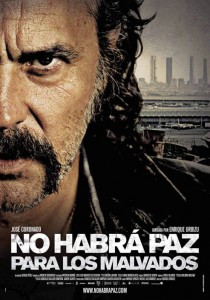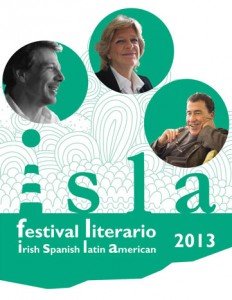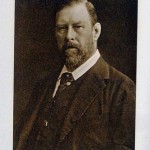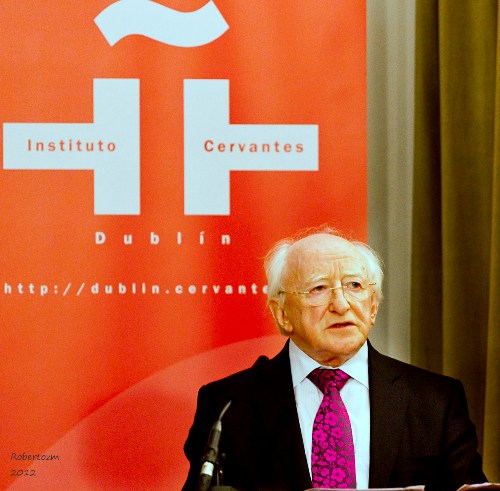Blog del Instituto Cervantes de Dublín
Torre Martello
¡Prepárate para Halloween! / Get ready for Halloween!
 Apenas unos días antes de la llegada de Halloween, con sus sobresaltos y sus escalofríos, comienza el nuevo ciclo de cine en el Instituto Cervantes de Dublín, un ciclo que nos trae cinco de las últimas creaciones españolas de cine de terror y suspense.
Apenas unos días antes de la llegada de Halloween, con sus sobresaltos y sus escalofríos, comienza el nuevo ciclo de cine en el Instituto Cervantes de Dublín, un ciclo que nos trae cinco de las últimas creaciones españolas de cine de terror y suspense.
Mañana miércoles os presentamos No habrá paz para los malvados, película que recibió 6 premios Goya en 2011. En ella, su director, Enrique Urbizu, narra la historia de Santos Trinidad, un inspector de policía que un domingo cualquiera, de camino a casa, ya muy borracho, se ve involucrado en un triple asesinato.
La película comienza a las seis de la tarde. Venga, ¡prepárate para Halloween!
To get you in the mood for Halloween, Instituto Cervantes Dublin brings you 5 of the latest Spanish films in the thriller and horror genres, as part of a nail-biting new film season.
Tomorrow, Wednesday 23rd, we start this film series with No rest for the wicked, a film by Enrique Urbizu that won 6 Goya Awards in 2011.
Following the trail of a missing girl, Police Inspector Santos Trinidad gets involved in a shooting. The result: three dead bodies and a witness who manages to escape. Santos will get into hot water explaining the mess if he does not find the witness. The hunt begins… and our film screening starts at 6pm. Come on! Get ready for Halloween!
Hispanic power / Poder hispano
 Is there anybody there on the other side of the book? How do readers and writers connect today? Faced with uncertainty, María Tena continues writing and editing, having dedicated her entire life to the world of culture, with eminent roles in this area.
Is there anybody there on the other side of the book? How do readers and writers connect today? Faced with uncertainty, María Tena continues writing and editing, having dedicated her entire life to the world of culture, with eminent roles in this area.
Álvaro Enrigue, literary critic, novelist and Professor of creative writing, hails from the United States, where Hispanic power is becoming increasingly visible. However, is it possible to “create” writers, when it seems like readers tear them apart? How much power does an editor have over the final draft? What about a critic or an agent? Does an author have any power? How powerful are the institutions that set trends?
Fernando Sánchez Dragó, essayist, novelist, anarchist and literary scholar, will also participate in the discussion of these powerful themes.
“Hispanic power” is the title of our fourth round-table discussion in our Isla Literary Festival. Moderated by Catherine Leen.
¿Hay alguien ahí, del otro lado del libro?, ¿dónde se encuentran hoy escritores y lectores? Ante la incertidumbre, María Tena continúa escribiendo y editando tras una vida entera dedicada al mundo de la cultura, con puestos de gran responsabilidad en esta área.
Desde Estados Unidos, donde el «poder hispano» se hace cada vez más visible, llega Álvaro Enrigue, crítico literario, novelista y profesor de literatura creativa. Pero, ¿acaso es posible «hacer escritores» cuando parece que los lectores se «deshacen»? ¿Cuál es el poder del editor sobre la calidad final de la obra?, ¿y de un crítico, de un agente?, ¿tiene algún poder el autor?, ¿cuál es el poder de las instituciones para marcar tendencias?
Sobre estos y otros poderosos temas tendrá también mucho que aportar Fernando Sánchez Dragó, ensayista, novelista, anarquista individualista, sabio de la literatura.
[Video] Bram Stoker y su Drácula con Alicia Mariño y Luis Alberto de Cuenca
Como sabéis, este año se conmemora el centenario de la muerte de Bram Stoker (1847-1912). Por ello, nos acercamos a la figura de este matemático y escritor de novelas y relatos irlandés de la mano de Alicia Mariño y Luis Alberto de Cuenca, grandes conocedores de su obra.
Aunque Bram Stoker fue un autor muy prolífico, se le recuerda principalmente por la creación de una de las historias de terror que más han influido a lo largo del tiempo: “Drácula”.
Alicia Mariño es licenciada en Derecho y en Filología Francesa. Ha trabajado sobre el género fantástico en distintos autores y últimamente ha orientado su labor hacia la literatura comparada, estudiando la génesis y evolución de ciertas leyendas europeas.
Luis Alberto de Cuenca (Madrid, 1950) escribe lo que él denomina poesía transculturalista en la cual lo trascendente se codea con lo cotidiano y la cultura popular se mezcla con la literaria. Fue director de la Biblioteca Nacional y Secretario de Cultura del gobierno español.
En estos videos son entrevistados por nuestro compañero Alfonso Fernández Cid. Edición de video de Cris Méndez.
In 2012 we are conmmemorating the 100th anniversary of Bram Stoker´s death (1847-1912). Therefore, we would like to bring the figure of this Irish mathematician and novel and short story writer closer to you.
Although his work was very prolific, he has been remembered mainly by the creation of one of the most influential horror stories in history: Dracula.
Alicia Mariño has a degree in Law and in French Philology. She has worked on the fantasy genre and recently she has focused on comparative literature, studying the origin and evolution of some European legends.
Luis Alberto de Cuenca (Madrid, 1950), one of Spain’s most famous living poets, writes what he calls ‘transculturalist’ poetry in which the transcendental rubs shoulders with the everyday, and literary and popular cultures intermingle. He uses both free verse and traditional metres and his verse is famous for its ironic elegance and its scepticism.
Interviewed by Alfonso Fernández Cid. Video editor: Cris Méndez.
Lo fantástico: Homenaje a Bram Stoker | The Fantastic: Hommage to Bram Stoker
 El miércoles día 28 de noviembre estarán con nosotros Luis Alberto de Cuenca y Alicia Mariño, El motivo de su visita: Bram Stoker. Porque este año se conmemora el centenario de la muerte del escritor (y matemático) dublinés. Aunque su obra fue muy prolífica, se le recuerda especiamente por la creación de una de las novelas de terror que más han influido y perdurado en la historia de la literatura: Drácula.
El miércoles día 28 de noviembre estarán con nosotros Luis Alberto de Cuenca y Alicia Mariño, El motivo de su visita: Bram Stoker. Porque este año se conmemora el centenario de la muerte del escritor (y matemático) dublinés. Aunque su obra fue muy prolífica, se le recuerda especiamente por la creación de una de las novelas de terror que más han influido y perdurado en la historia de la literatura: Drácula.
En torno a Drácula y a Bram Stoker girará la charla moderada por el Dr. Jarlath Killen, profesor de Literatura Victoriana del Trinity College Dublin. Comenzará a las 18:30 horas en nuestro Café Literario.
Luis Alberto de Cuenca (Madrid, 1950) escribe lo que él denomina poesía transculturalista en la cual lo trascendente se codea con lo cotidiano y la cultura popular se mezcla con la literaria. Fue director de la Biblioteca Nacional y Secretario de Cultura del Gobierno de España.
Alicia Mariño es licenciada en Derecho y en Filología Francesa. Ha trabajado sobre el género fantástico en distintos autores y últimamente ha orientado su labor hacia la literatura comparada, estudiando la génesis y evolución de ciertas leyendas europeas.
Instituto Cervantes Dublin is pleased to invite Luis Alberto de Cuenca and Alicia Mariño, who will payhomage to the Dubliner writer Bram Stoker. The talk will be chaired by Dr. Jarlath Killen, Lecturer in Victorian Literature at Trinity College Dublin. Do not miss this event today at 6.30pm at Café Literario.
This year we are conmmemorating the 100th anniversary of Bram Stoker´s death (1847-1912). Therefore, we would like to bring the figure of this Irish mathematician and novel and short story writer closer to you. Although his work was very prolific, he has been idolized and remembered by the creation of one of the most influential horror stories in history: Dracula.
Luis Alberto de Cuenca (Madrid, 1950), one of Spain’s most famous living poets, writes what he calls ‘transculturalist’ poetry in which the transcendental rubs shoulders with the everyday, and literary and popular cultures intermingle. He uses both free verse and traditional metres and his verse is famous for its ironic elegance and its scepticism.
Alicia Mariño has a degree in Law and in French Philology. She has worked on the fantasy genre and recently she has focused on comparative literature, studying the origin and evolution of some European legends.
El presidente Michael D. Higgins en el Instituto Cervantes de Dublín / President Michael D. Higgins in the Instituto Cervantes in Dublin
El presidente de Irlanda, Michael D. Higgins, inauguró oficialmente la primera edición del Festival ISLA de Literatura el pasado 2 de noviembre en el Instituto Cervantes de Dublín. y con ello contribuyó de manera decisiva a su éxito. El festival, por el que pasaron a lo largo del fin de semana cerca de mil asistentes, reunió a escritores de Argentina, Chile, Cuba, México, Irlanda y España en torno a una serie de lecturas, mesas redondas y proyecciones cinematográficas.
El presidente habló ante una sala abarrotada con cerca de 200 personas y les dio la bienvenida en español, irlandés, e inglés. Después de saludar a los asistentes, centró su alocución en los recuerdos de su reciente viaje diplomático por América Latina.
«He regresado recientemente de mi visita a Chile, Brasil y Argentina, una parte del mundo que tiene un lugar especial en mi corazón», dijo Higgins. «Durante este viaje, me llamó la atención una vez más la profundidad del compromiso con la cultura y la literatura irlandesa que existe en América Latina y cómo nuestras dos tradiciones se han influido y enriquecido mutuamente».
Higgins habló después sobre el papel que la escritora Kate O’Brien ha jugado en la literatura irlandesa y española, y la intensa conexión de la autora con España.
El amor del presidente por la poesía también se hizo evidente cuando aplaudió el énfasis que el Festival ISLA de Literatura hizo sobre este género en su programa. «Estoy impresionado por la profundidad y la fuerza de la poesía en este programa. Seamus Heaney, en su magnífica colección de ensayos «The Redress of Poetry», habla de cómo la poesía equilibra «la balanza de la realidad hacia un cierto equilibrio trascendente». El festival ISLA, con sus fuertes elementos interculturales, y los muchos poetas representados en él, como Maighread Medbh y Lorna Shaughnessy, parece tener esa inventiva deliciosa de la que Heaney habla en su obra».
El presidente finalizó leyendo el poema de Oliver St. John Gogarty «An Long» primero en lengua irlandesa y después en inglés.
Información basada en la nota de prensa de Megan Specia y Sergio Angulo.
Michael D. Higgins launched the first Irish, Spanish, and Latin America (ISLA) Literary Festival on the evening of November 2 in the Instituto Cervantes in Dublin. The festival, which brought together writers from Argentina, Chile, Cuba, Mexico, Ireland and Spain, was held over the weekend and featured a series of readings and round table discussions.
The President spoke to a crowd of approximately 200 participants and welcomed them in Spanish, Irish, and English. After greeting the crowd, he spoke to those gathered about a recent diplomatic trip to Latin America.
“I have recently returned from visiting Chile, Brazil, and Argentina, a part of the world which has a cherished place in my heart,” said Higgins. “During these visits, I was struck again by the depth of the engagement with Irish culture and writing that exists in Latin America and how our two traditions have influenced and enriched each other.”
Higgins went on to speak about the role than writer Kate O´Brien has played in Irish and Spanish literature, and the intense connection of the author to Spain.
The President´s love of poetry was also evident when he applauded ISLA´s emphasis on the genre. Said Higgins, “[I am] impressed by the depth and strength of poetic representation in the programme. Seamus Heaney, in his great collection on ´The Redress of Poetry´, speaks of how poetry balances ´the scales of reality towards some transcendent equilibrium´. The ISLA festival, with its strong intercultural elements, and the many poets represented like Maighread Medbh and Lorna Shaughnessy … would seem to have that self-delighting inventiveness of which Heaney speaks.”
He closed by reading Oliver St. John Gogarty´s poem “An Long” (The Ship) first in the Irish language and then in English.
Megan Specia & Sergio Angulo




